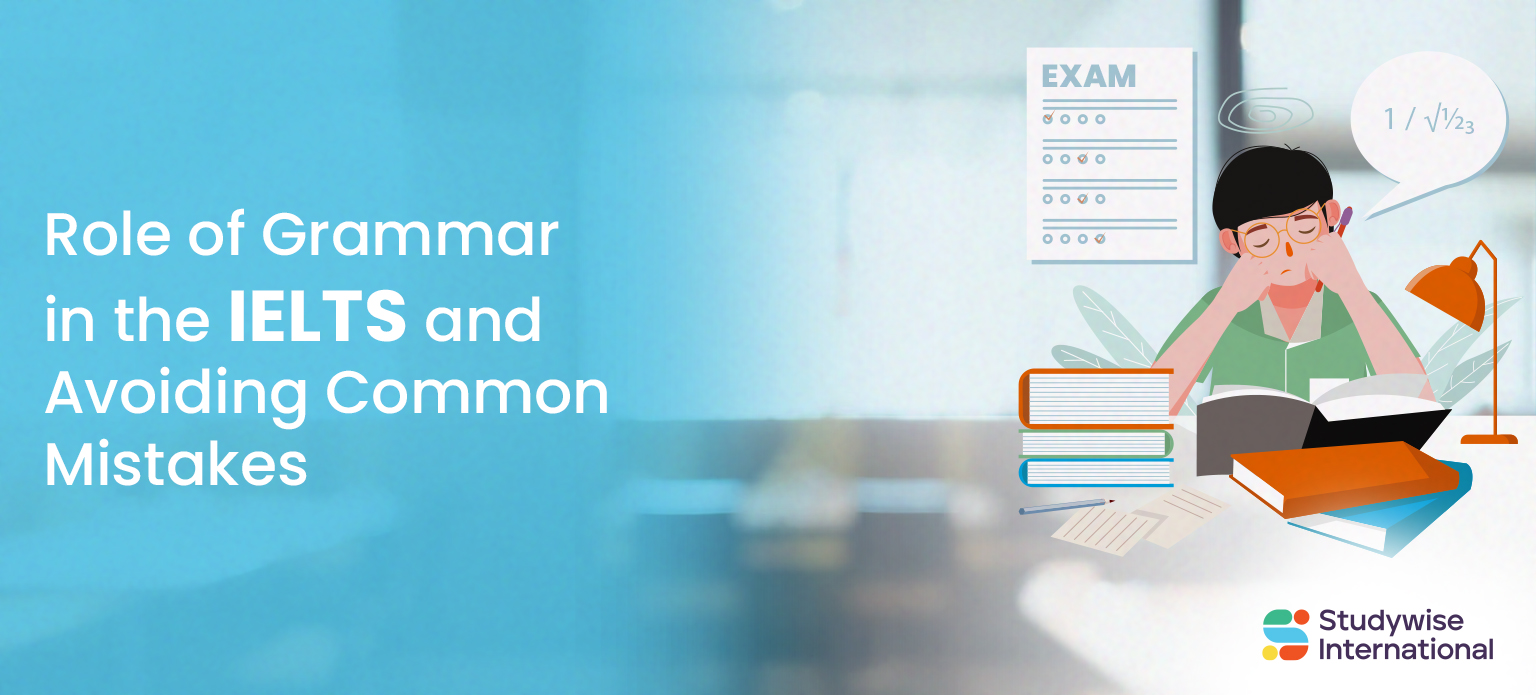
Role of Grammar in the IELTS and Avoiding Common Mistakes
- Categories Abroad Test Preparation, All Study in Abroad Blogs, IELTS
- Date May 28, 2024
Students across the world take the popular IELTS tests. Countries like the UK, the USA and Australia among other 140 accepting countries recommend this test at the entrance level. IELTS helps students aspiring to study in foreign institutes demonstrate their English language skills. It assesses 4 major skills of the language – Reading, Listening, Writing and Speaking. Further, with different sets of questions, it examines their ability to understand, reflect and participate in varied forms of conversations. In effect, students must have a strong command over the language with a fine grasp of grammar, vocabulary and other major language skills.
In this blog, we will delve into the syllabus, rules and common errors as well as tips to strengthen Grammar for IELTS 2024.
IELTS Grammar Syllabus
Grammar can have a severe impact on your IELTS score. Particularly, the Speaking and Writing sections dedicate 25% of the band score for grammatical range and accuracy. Even in the Writing Section, grammatical errors can alter both the meaning and impact of the essays. Coherence and cohesion, ie. the clarity in idea and sentence structure, carry a valuable amount of weight in the IELTS scoring system. Safe to say that poor grammar may drive about 1/4th of your IELTS score down the drain. At the same time, the alternate can build an impressive IELTS score and bands.
IELTS has a strategic and stagnant syllabus and topics under its general guidelines. Whereas, there is no explicitly designed syllabus for Grammar in IELTS. However, it has roots across all the sections of the exam. Candidates must go through the basics like Sentence structure, Subject-verb agreement and pronoun agreement. When this builds the foundation of your language skills, Modifiers, Parallelism and Voices are equally important. Furthermore, students must also practice Idioms and Figures of Speech to improve their Writing style and score better in that section.
Read more: IELTS Band Scores: What They Mean, How to Calculate & more
Common Grammar Mistakes and Rules for IELTS
If you wish to score 7.0 or more, you must adhere to grammatical range and accuracy in the Speaking and Writing modules. This can be achieved by using a variety and complexity coupled with accurate usage of grammatical structure. Some of the rules to stir and gulp down are:
Sentence Structure
All languages have a defined sentence structure. A typical English sentence comprises a subject and a predicate. In further bifurcation, you will find the predicate to follow a pattern too! It consists of a helping verb + verb, preposition and object. When in French, the adjective comes after the object, it has the reverse position in an English sentence or phrase.
Subject-Verb Agreement
This is one of the easiest yet the most common aspects to lose points in. Verbs can be singular or plural. Whichever the value, it should also reflect in the Noun used.
The Right Form of the Verb
When describing an action that is happening, has happened or will happen, ensure that the sentence aligns with the form of the verb used. For an ongoing incident, use the Present Continuous Tense whereas for an incident that had happened in the past, use the Past Perfect Tense. Candidates not only need to maintain the same form of the verb in the sentence but also throughout their speech.
Usage of Articles
A, an and the are called articles. To indicate specific things, candidates must use the article ‘the’. Notably, not every sentence requires an article. Further, they are usually not used before uncountable nouns. However, ‘the’ is used before a subject with a superlative degree regardless of that factor.
Adjective and Adverbs
Adjectives and adverbs help bring more life to the story. Students appearing on IELTS must prepare for a variety of them to exhibit their ideas and opinions. For instance, instead of saying, “I read a good book with a good plot”, it seems rather impressive to say, “I read an inspiring book quite recently. It has an impressive plot.”
Preposition
As the language advances, prepositions develop and advance in both counting and understanding. While they seem easy, prepositions can be tricky. From basic prepositions like ‘on’, ‘in’ and ‘of’ to phrases like ‘out of’, ‘from the right of’ and ‘right beside’. Prepare with an in-depth knowledge of this part of the speech.
Clause
Candidates must avoid using time and conditional causes when talking about an action in the future. Instead, they can use present simple tenses.
Contractions
IELTS questions come with instructions. Students must carefully read and understand them before answering the question. Often, there could be a word limit or other specifications. By understanding contractions, they can perform the tasks easily and efficiently. For instance, the instruction might suggest to use 2 words or numbers. It can be answered with ‘They’re good.’ instead of using 3 letters – they, are and good. At the same time, the usage of contractions must be severely avoided in the Writing section due to its informal nature.
Read more: IELTS Writing Task 2 Essay: Topics, Tips and More
Tip to Improve IELTS Grammar
Practice makes the man (and woman) perfect. But it is not only practice that can help improve skills. Here are a few things that can help make a difference. Taking practice tests is a proven way of improvement. It helps students analyse their mistakes and build alternative responses. Practice a variety of questions under the IELTS syllabus. Further, consider reading and understanding others’ responses. It would not only help in gaining a new perspective but also build a better understanding of what you can do differently. It is about writing and speaking the right thing within the allotted time.
Read more: Effective Time Management Techniques for the IELTS Exam
Often, students dwell on learning everything. The requirement couldn’t be further from that. Candidates need to invest in the quality of books and resources, and not the quality of them. Some of the best books to improve Grammar for IELTS are Cambridge English: Grammar For IELTS, English Grammar in Use by Raymond Murphy and Oxford Practice Grammar. If they have more time in hand, they can consider Manhattan GMAT Sentence Correction and Collins Grammar for IELTS as well. However, self-learning students are unlikely to know where they are going wrong. Seek the help of a professional (or non-professional) and gain feedback on your writing. Alternatively, you can also use a Grammar checker like Grammarly.
Ready to ace the test? Enroll on our flexible and customised IELTS Coaching Classes. Connect with Studywise International for a FREE DEMO CLASS today!
You may also like

Ireland Intake 2024-25: Universities & Preparation Timeline

TOEFL Scoring System and Validity


